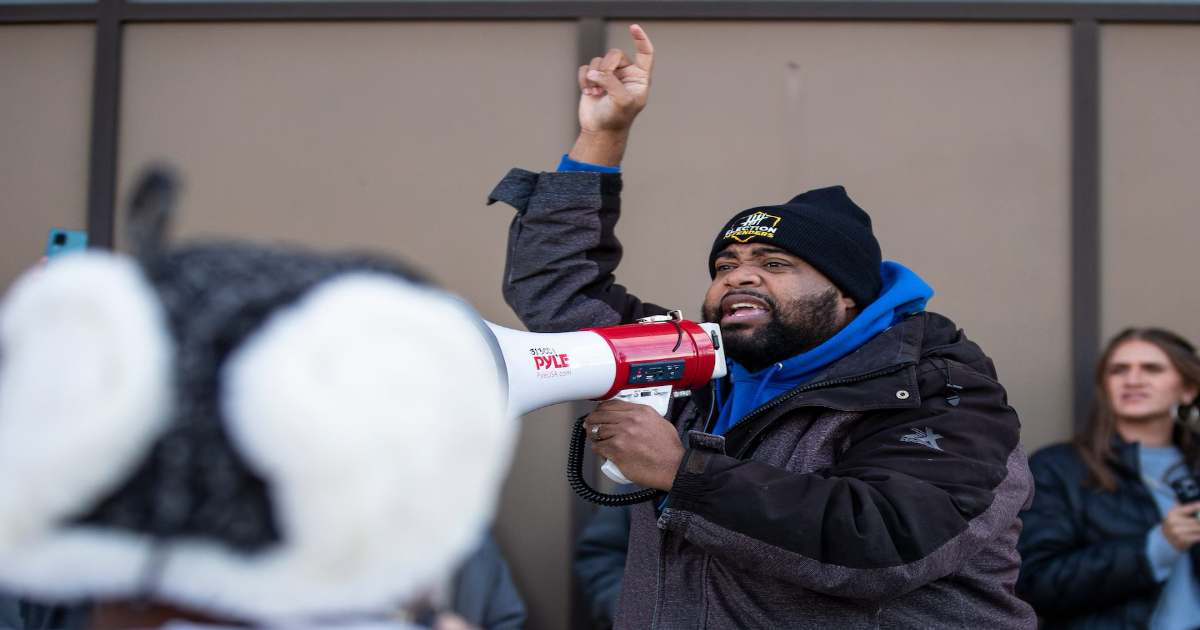Democrats’ internal battle to shape the future of the party has arrived in a Detroit-area congressional district, where a liberal group that has clashed with establishment leaders in recent years is making its first foray into the 2026 midterm elections.
Justice Democrats, a political organization with a record of backing younger, more liberal challengers against older, more moderate Democratic incumbents, announced on Monday its first primary challenge of the 2026 midterm elections. The group endorsed Michigan state Rep. Donavan McKinney, 32, against incumbent Rep. Shri Thanedar, 70, in a largely Democratic district.
The race encapsulates some of the generational and ideological fault lines running through the party since a disappointing 2024 election cycle largely shut the party out of power and prompted impassioned debate about how to rebuild. Justice Democrats praised McKinney as a climate-focused, working-class candidate who has firsthand experience with challenges such as eviction, compared with Thanadar — who grew up poor in India, then built a fortune with chemical and pharmaceutical businesses — who it portrayed as self-promotional.
Thanedar, who is Indian American, has faced serious intraparty opposition before in his district, which has a plurality Black population. He drew a 2024 primary challenge from Detroit City Councilwoman Mary Waters, who is Black, and defeated her by double digits.
In an interview, McKinney, who is Black, emphasized that the district is among the poorest in the country and argued that his campaign is more about class than race or ideology. “This is about the working class versus the 1 percent,” he said. “At the end of the day, I know the struggles of my community. I lived it.”
In a statement, Thanedar said: “Voters know my background. I grew up in abject poverty and with a good education, hard work, and some luck, was able to get my education, start a small business and lift my family out of poverty.”
“Voters have a choice between my bold, strong and proven leadership, or Hollier’s incompetence, or McKinney’s inexperience,” Thanedar continued.
Justice Democrats has successfully supported some high-profile leftist candidates in U.S. House primaries in recent years, including Rep. Alexandria Ocasio-Cortez (D-New York). It has helped unseat five Democratic incumbents since it began in 2017. But it has also experienced setbacks: Last cycle, the group was forced to play defense to protect its own incumbents from primary challenges in some of the most expensive House races in the country. In the process, it lost two members of the “squad” of liberal representatives the group had worked to elect, Reps. Jamaal Bowman in New York and Cori Bush in Missouri.
As Democrats grapple with how to respond to President Donald Trump’s second term, a growing number of candidates have started primary challenges against incumbents they have accused of not acting swiftly or aggressively enough.
Some Democrats have also expressed frustration with a party leadership that features a number of older elected officials who have served in office for many years. Their anger grew after President Joe Biden’s decision to run for reelection before dropping out, and after some Democrats backed a GOP funding bill this year to avert a government shutdown. This year, two Democratic members of Congress in their 70s have died in office, furthering young candidates’ urgency to confront aging party leaders.
“The moment is ripe to reshape the makeup of Congress, and voters will only be energized enough to elect a Democratic majority in November if they can vote for Democrats they actually believe in the primaries. Voters are demanding that the Democratic Party be more progressive and usher in a new generation of leaders,” Justice Democrats said in a statement announcing its endorsement.
A quickly expanding cohort of Gen Z and millennial candidates have announced efforts to topple Democratic incumbents, largely in safe blue seats. DNC Vice Chair David Hogg recently said his political organization would back challengers against House Democrats in safe seats, drawing immediate blowback from other members of the party. DNC Chairman Ken Martin on Thursday denounced the move, saying that “no DNC officer should ever attempt to influence the outcome of a primary election.”
Trump’s approval rating is in decline, and some independent voters are starting to sour on Trump and his agenda, offering opportunity for Democrats to make gains. But the party faces its own challenges.
A Washington Post-ABC News-Ipsos poll found that Americans trust Trump over congressional Democrats, 37 percent to 30 percent, when it comes to dealing with the country’s major problems and see the Democratic Party as somewhat more out of touch “with the concerns of most people” than either Trump or the GOP. Voters and strategists have called for Democratic elected officials to do more to break through and show that they are doing all they can to fight Trump.
McKinney was elected to the Michigan state House in 2022, representing parts of Wayne and Macomb counties. Before that, he was the political director of Climate Power, a national climate organization, and of a health-care union. Alexandra Rojas, executive director of Justice Democrats, said in a statement that McKinney “represents the future the Democratic Party should be fighting for: working class people taking our power back from multimillionaires to deliver for everyday people.”
Thanedar was elected in 2022, after serving in the state House, and is a member of the New Democrats Coalition and the Congressional Progressive Caucus.
Adam Hollier, a former state senator who campaigned against Thanedar in 2024 but unexpectedly failed to qualify for the ballot, said this month that he would challenge Thanedar again.
During the 2024 primary, the head of the Congressional Black Caucus at the time, Rep. Steven Horsford (D-Nevada), endorsed Hollier over Thanedar. So did some other members of the caucus. McKinney said he has been “in communication” with the caucus and expects members to be involved in the primary.
